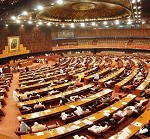Every first is important—especially when the first concerns an elected civilian government completing a full term in office in a Pakistan that is more troubled than it has ever been in its 65-year history.
Is this happenstance or has the civil-military equation begun to tilt in favour of civilians? If it is the latter, then is this a strategic shift by a military thus far obsessed with a search for parity with India?
Is it sign of a recognition by the armed forces that the people of Pakistan would reject a direct military coup? Or is it simply the uncertainty over how an international community, led by the US—on which Pakistan is so dependent for financial handouts—would respond to a coup?
It is likely a combination of all three that has made the Pakistani military more circumspect about overt interference. Internally, the social fabric of Pakistan is torn by increasingly violent Islamist terrorist groups indiscriminately lashing out against minorities: be they Shias, Christians, Hindus, Balouch, schoolgirls, journalists or just “liberals”.
Regionally too, the situation is roiling. Afghanistan is bracing itself for the departure of ISAF (International Security Assistance Force) troops next year in the midst of violence generated by the Pakistani surrogate Taliban which is positioning itself for a bargained or forceful return to power—if not in Kabul, then at least in its old Pashtun strongholds along Pakistan’s restive western border.
The outcome is unpredictable.
Unable to change old habits, the Pakistan assembly, two days before demitting office, damaged the only thing working for Pakistan: an improving relationship with India. It did this by passing a resolution condemning the hanging of Afzal Guru, the terrorist convicted in the December 2001 attack on our Parliament and demanding that his remains be handed over to his family. However much criticism the government of India may deserve for its insensitive handling of the Afzal Guru case, the only thing the resolution achieved was to bring all parties in India’s Parliament together to return the favour through a resolution condemning Pakistani interference in India’s internal affairs.
Pakistan’s relations with the US, and by extension the West, are so troubled that its former ambassador in Washington, Hussain Haqqani, is recommending “a break-up” with its benefactor, a parting of ways so that “Pakistan can find out whether its regional policy objectives of competing with and containing India are attainable without US support”.
The reality is that Pakistan can hardly survive without combined annual injections of approximately $5 billion in US civilian and military funds and World Bank loans. Memories of the termination in US aid that followed the June 2001 Pervez Musharraf-led coup are a clear disincentive for a repeat in Islamabad.
It is not that the military is caving in without a fight: 2012 was the year of former cricketing hero Imran Khan emerged as a popular leader with a following large enough to tell the world that he had the army behind him.
There was the even more bizarre caper by Pakistani-Canadian preacher Muhammad Tahir-ul-Qadri, the size of whose January 2013 rally forced the elected government (a la ours with Anna Hazare) to negotiate the date of its own dissolution and agree to hold early elections while abolishing the Election Commission. The hand of the army in this is obvious; the Zardari government was anyway completing its term in mid-March and such a demand was made only to expose its weakness.
Eventually, when it did become clear that the Zardari government would be allowed to complete its term, speculation picked up on whether this signified a genuine change in thinking in the Pakistani armed forces and intelligence agencies. The Pakistani foreign minister began speaking of Pakistan’s change of heart vis-à-vis Afghanistan: “Allow me to say that we seek no strategic depth in Afghanistan…The only strategic depth that we seek with Afghanistan is friendly…on the principle of stable, peaceful Afghanistan, a sovereign Afghanistan, an independent Afghanistan.” If only anyone could believe that.
On 12 March, the former director of Afghanistan’s National Directorate of Security said on the Pakistan Express News television channel that “when it comes to Afghanistan, they (Pakistan) want to create limitations for us, treating us not as a nation but as a sub-nation, as to whom we should talk to or who should be our allies”.
Even Pakistan’s famed writer Hamid Mohsin, mourning the killing of Shias, in a piece evocatively titled To fight India, we fought ourselves, argues that for the “first time the new official doctrine of the Pakistan Army identifies internal militants rather than India as the country’s number one threat”. That may be, but in an increasingly impoverished Pakistan reeling under daily power cuts, the armed forces were still able to appropriate almost $6.5 billion, or 3% of the gross domestic product.
Whether or not the civil-military equation is really changing will be revealed as the campaign for elections scheduled for May proceeds.
Former president Musharraf has said that he is returning next week to participate in the forthcoming elections. He has little support since he contributed greatly to the revulsion the Pakistani public feels for military rule.
In Islamabad, the conspiracy capital of South Asia, there are stories that current army chief, Ashfaq Parvez Kayani, may be elevated to the rank of field marshal, probably in the hope that he will allow elections to go ahead.
But the fear of a King’s Party continues to cast a shadow over Pakistani hopes of becoming a normal country and eventually a functioning democracy.
Ambassador Neelam Deo is Director of Gateway House: Indian Council on Global Relations and former Ambassador to Denmark and former Joint Secretary for Myanmar, Sri Lanka, Nepal and Bangladesh.
This article was originally published on March 19 2013 by The Mint, here.


